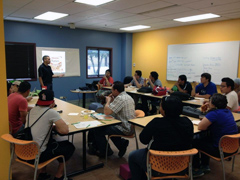The Pulse Archives
Students benefit from early financial literacy
By Elizabeth Ledesma | Pulse staff reporter
 College is a time to learn and enjoy life, but the earlier you learn about good money management skills, the happier your life will be. Studies show that finances are the number one cause of stress, divorce and depression.
College is a time to learn and enjoy life, but the earlier you learn about good money management skills, the happier your life will be. Studies show that finances are the number one cause of stress, divorce and depression.
“If you don’t grasp the skills of learning how to manage the money you’re making, you’ll always live paycheck to paycheck,” said David Rodriguez, Financial Education advocate for Generations Federal Credit Union. “It doesn’t matter how much money you make.”
Here are some tips to help you get started on your journey to financial freedom:
Keep money safe. That stash of bills you have under your mattress isn’t necessarily the best place to keep it. A recent survey done on Palo Alto’s campus showed that only one-third of students enrolled currently have a savings account.
“I’ve been meaning to go [open an account], just haven’t had time,” said Samantha Ochoa, a Liberal Arts student.
Lack of time and not having a job were the two main reasons students said they didn’t have an account. Make time to research banks and credit unions in the area and open a savings account to help keep your money safe.
Make a budget and keep it. Use a notebook or journal to write down an estimate of your monthly income and allocate where that income needs to go.
“[The] most vital tool when people talk personal finances is creating a budget. Get on a plan and work with that plan,” said Rodriguez. “When you see it on paper, it does put it in a different perspective than just making money and spending it.”
Look at your bank statements frequently and determine if there’s any spending you can cut. The $20 a week on pizza adds up to $1,040 for the year. It’s money that a few home-cooked meals can save.
Start building your credit. If you aspire to someday purchase a home or a new car, now is the time to start working toward it. You don’t necessarily need a credit card or loan to begin; get a steady job and start building your savings account. Saving up and paying cash for an Xbox you’ve had your eyes on can be quite rewarding.
Spend wisely. Avoid credit cards, if you can. Their high interest rates can quickly overwhelm you in debt. Instead, learn to spend less than you actually earn. Don’t earn much? Don’t spend much either.
“I try to just spend half of what I make and save the rest,” said Hector Peña, a freshman Business Management student.
If you have financial aid money left over after paying your tuition and buying your required textbooks, save it in a separate account. With the government changing the policy of free aid, this may be the money that saves you from having to accept loans to finish school in the future.
Generations Federal Credit Union hosts free Financial Literacy classes led by Rodriguez every Tuesday afternoon from 11:30 a.m. to 12:30 p.m. in the Student Center, CAT Room. He covers different financial topics each week and even provides free pizza and drinks for all who attend. No reservations are needed. The following is an upcoming schedule of these classes:
March 19- Saving and Investing
March 26- The Better Buyer
April 2- What to do when in financial trouble
April 9- Identity theft
October 2012
- Fulbright Grant takes PAC alumna to Russia
- PAC student makes All-State Jazz Ensemble
- A Step Closer to Citizenship for Dreamers
- In-demand degrees impress employers
- Students benefit from early financial literacy
- Today's students and faculty expect quality website
- Recent tragedies bring campus safety into spotlight
- Title IV aid helps students pursue higher ed
- Service Learning Benefits students, community
- Knowledge key to healthier eating
- Scholarships benefit PAC Students
- Seasoned students add spice to Palo Alto's diversity
- College students tackle daily stress
- River Walk expansion enhances South Side's charm
- Local plans for Spring Break save money